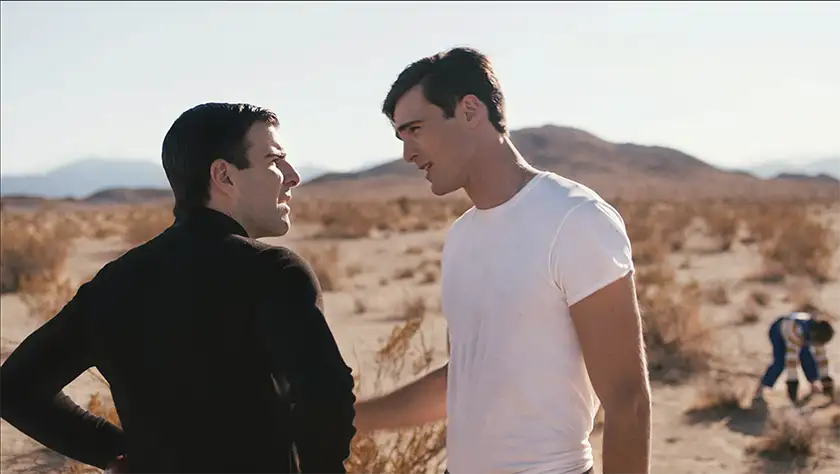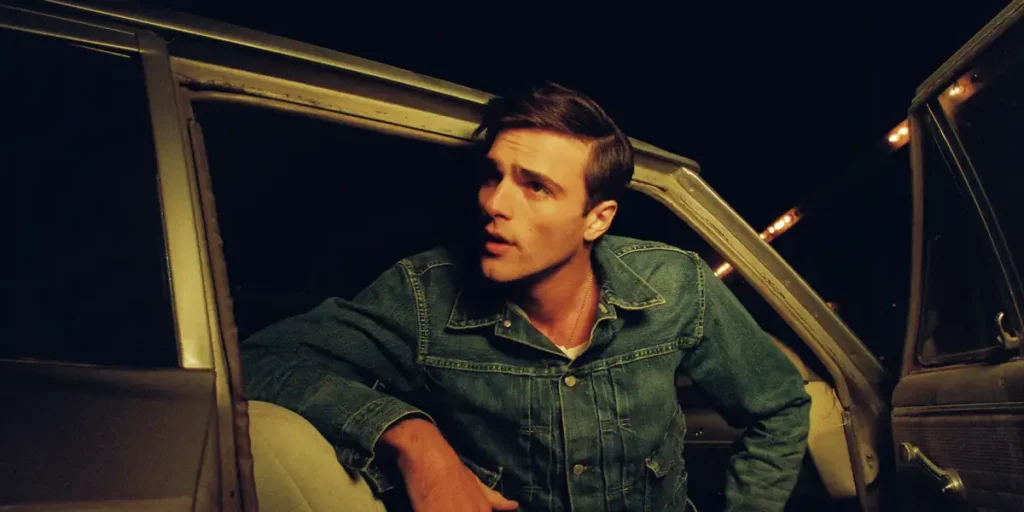Despite being inspired by a compelling true-crime story, He Went That Way falls flat due to a superficial plot and underdeveloped characters.
At first glance, Jeffrey Darling’s directorial debut, He Went That Way, has an enticing premise for a film. Based on a true-crime story from the 60s, the feature centers around Jim (Zachary Quinto, of The Boys in the Band), an animal handler known for his televised performances alongside his beloved chimpanzee, Spanky. However, Jim and Spanky face the challenge of securing work, resulting in financial struggles. Their situation takes an even darker turn when Jim offers a ride to Bobby (Jacob Elordi, of Saltburn), a seemingly innocent hitchhiker, only to later unveil that Bobby is, in fact, a serial killer. As they journey back to Chicago together, Bobby’s evil nature gradually emerges, leaving Jim fearful of becoming the murderer’s next victim.
Despite my true-crime documentary-watching tendencies, this case was entirely unfamiliar to me, though the details stood out due to their peculiar and distinctive nature. If handled skillfully, these facts alone could have laid the groundwork for a gripping crime thriller with a truly bizarre twist. However, He Went That Way veers off course as it attempts to inject its own creative narrative into the true-crime story by highlighting an artificial connection between Bobby and Jim that feels forced. Bobby’s erratic behavior swings between menacing threats toward Jim and moments where he attempts to establish a rapport with him. This back-and-forth creates an odd dynamic, given the basis of the story, and disrupts the film’s ability to cultivate suspense or establish significant tension between the characters. Moreover, He Went That Way fails to adequately convey the severity of the heinous crimes committed both before Bobby encounters Jim and during their time together.
It’s always a pleasure to see Quinto on-screen, but his portrayal of Jim appears excessively laid back regardless of Bobby’s alarming behavior. Despite Jim encountering intense and downright terrifying situations with the cold-blooded killer on multiple occasions, his composed demeanor seems out of place in the narrative and lacks credibility. As Jim travels alongside a murderer across the country in a confined space, he fails to convey any apparent or believable fear, undermining the sense of danger that viewers ought to feel for him. Despite Bobby’s threats towards Jim, the animal handler shrugs off each menacing encounter and subsequently engages with Bobby as if they are friends.
This hints at the possibility of Jim playing Bobby to ensure survival. However, He Went That Way doesn’t effectively reflect this motive, leaving viewers uncertain about the film’s underlying messages and intended themes throughout the movie’s runtime. Moreover, the feature persists in homing in on an unconventional bond the pair share, even suggesting potential attraction. In addition, He Went That Way’s tonal inconsistency and conflicting signals further complicate how the feature intends its audience to interpret the characters and their relationship, ultimately leaving us without definitive answers.

Elordi’s performance is commendable as he embodies a real-life serial killer, showcasing his versatility as an actor. Through Bobby, Elordi navigates a dark persona, revealing glimpses of his character’s abusive past and his underlying desire for acceptance. However, Elordi’s performance feels confined to the limitations of a lackluster script, preventing him from fully immersing himself in the role. He Went That Way barely scratches the surface of each character, resulting in the audience feeling disconnected from the story due to the lack of depth. Similarly, Spanky’s appearances are sporadic, denying viewers the chance to witness his entertaining talents, an angle that may have added more vibrancy and intrigue to the narrative.
He Went That Way impresses most with remarkable cinematography, showcasing shots of the desert that beautifully depict the western United States landscape and skillfully capturing the essence of the 1960s through meticulous set designs and wardrobe choices. However, despite captivating visuals that effortlessly transport viewers to the era intended, the film falters due to a shallow storyline and underdeveloped characters. As a result, it lacks the gripping narrative and substance required to reflect the compelling true crime story the narrative is based on.
He Went That Way will be released in select theaters on January 5, 2024 and on demand on January 12.

